Broad Bean and Prawn Stir Fry is a very easy side dish with pretty colours. It is best served in spring when broad beans are in season. The combination of the fluffy texture of broad beans and plump prawns is superb.
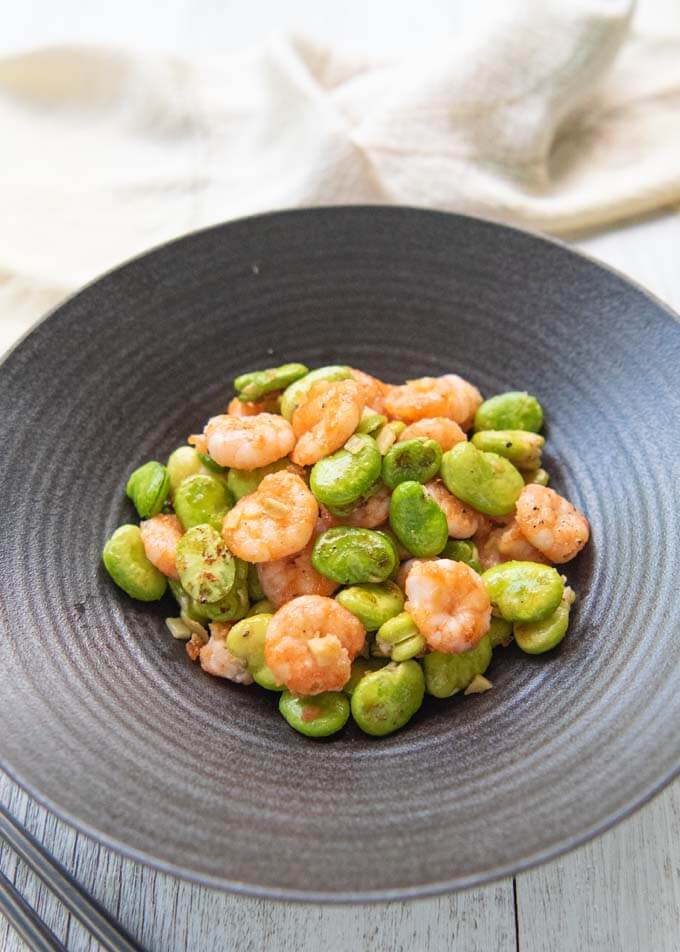
I only used ginger, cooking sake, and salt & pepper to flavour the stir-fry. It is a typical Japanese way of cooking food with light seasonings so that you can enjoy the original taste of the ingredients.
When I see broad beans (also called fava beans) in pods at vegetable shops, I know that spring has come. Broad beans are seasonal spring vegetables. Unlike other spring vegetables such as asparagus, broccoli, and cabbage that seem to be sold all year round, broad beans only come out in spring.
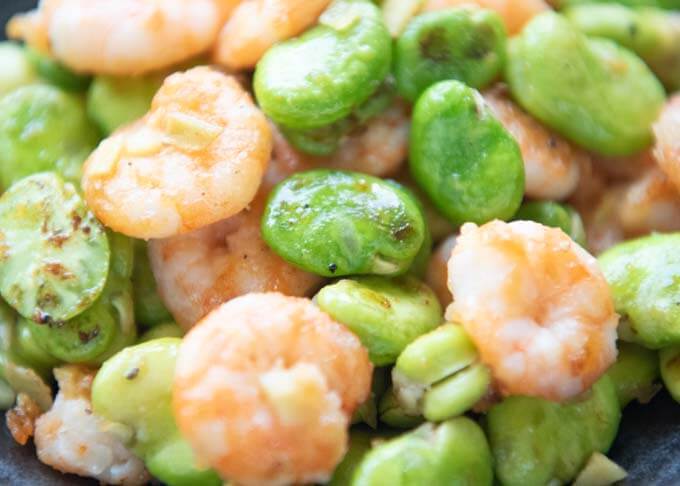
They do come in a large pod and the edible beans to pod ratio is pretty low. But the beans are so delicious, and you can taste sweetness.
Broad bean pods are quite thick, and it is difficult to know if the beans inside are good or not. You can only guess from the pods. Look for the pods that are crisp and firm. Feel for the beans inside along the pods. You should feel plump beans inside, with no air pockets.
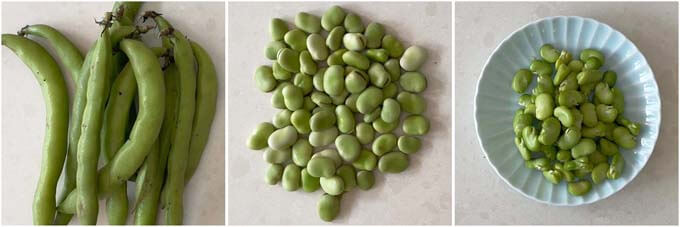
What’s in My Broad Bean and Prawn Stir Fry
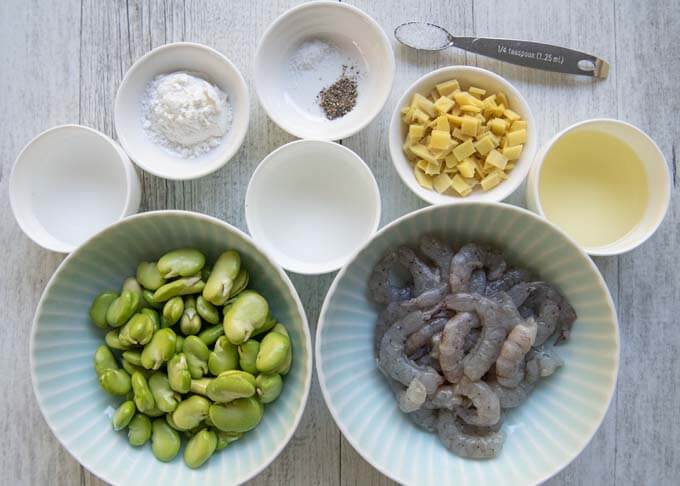
- Broad beans in pods or without pods
- Fresh school prawns, peeled and deveined
- Finely diced ginger
- Oil
- Salt
- Water
- Corn flour/cornstarch
- Cooking sake
- Salt and pepper
School prawns are the best for today’s dish because the size of the cooked prawns is similar to the size of the broad beans. The body length of my school prawns was about 7cm/2¾”. It is tedious to peel many small prawns, but the end results are great.
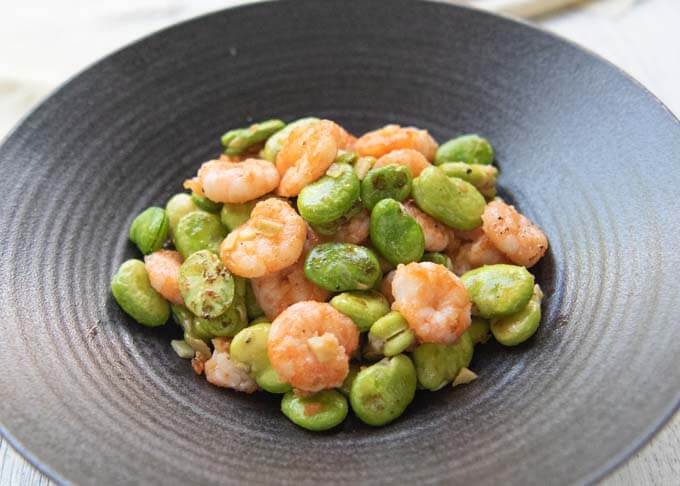
You can use large prawns if you prefer. You need to cut them into 3-4 pieces depending on the size of your prawns.
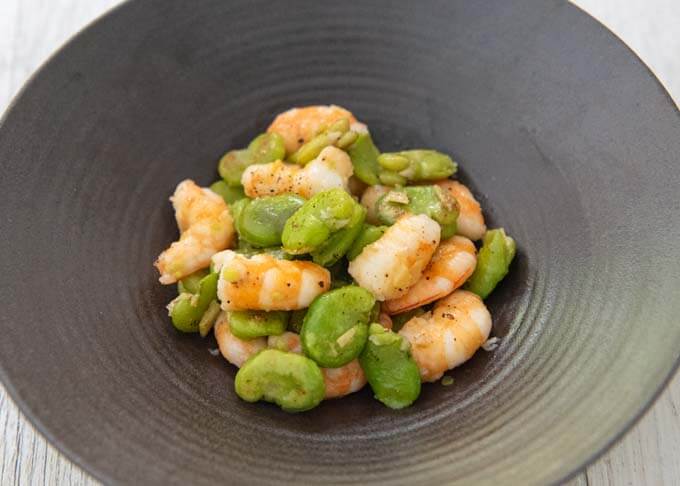
Broad Bean and Prawn Stir Fry, made with large prawns.
My broad beans weighed about 500g/1.1lb in pods. After removing pods, they weighed 200g/7.1oz. The final weight of my broad beans without skin was 118g/4.2oz.
You can use frozen broad beans if broad beans are not in season. Check if the frozen broad beans are already blanched or not. If already blanched, you don’t need to cook them for as long as the fresh broad beans. See the notes section of this recipe card.
How to make Broad Bean and Prawn Stir Fry
You will spend the most time on getting broad beans out of the pods and the soft skins, which you can do a long time before requiring them. The actual cooking time is very short as most stir-fries are. See the video.
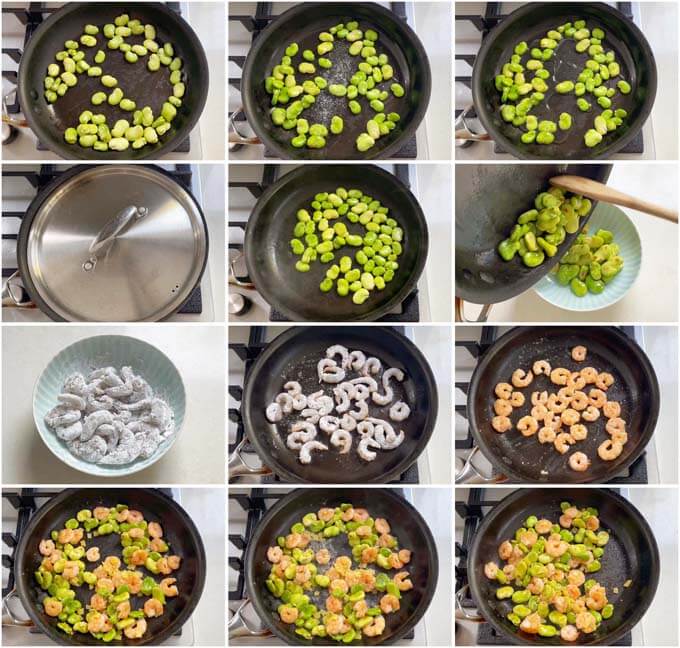
- Take beans from pods and remove the soft skin.
- Sauté broad beans in a frying pan over medium heat, then add salt and water to steam-sauté them with a lid on.
- Transfer the beans to a plate and wipe off the bottom of the frying pan off.
- Dust the prawns with corn flour/cornstarch.
- Sauté in the frying pan over medium-low heat until the prawns change the colour.
- Add ginger and the broad beans. Stir-fry to mix them.
- Add cooking sake, a pinch of salt & pepper, then quickly mix.
- Remove from the heat and serve.
I had 11 pods, and it took me about 15 minutes to remove beans out of the pods and soft skins. But cooking took less than 10 minutes. Here is the step-by-step photo of how I removed the pods and soft skins. Watch the video (at the beginning) too.
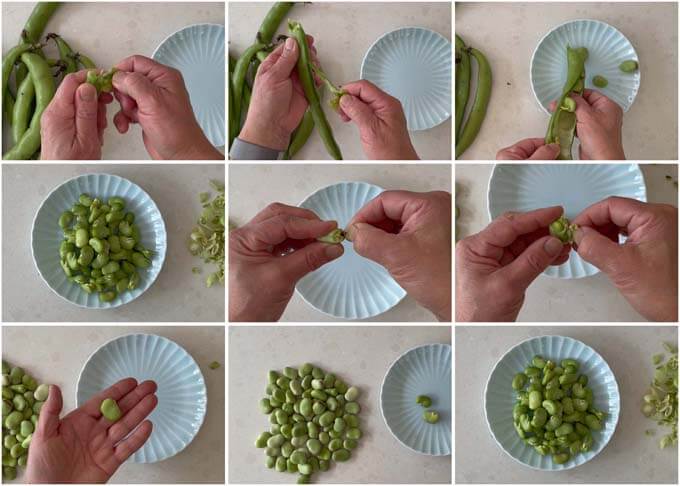
Broad Bean and Prawn Stir Fry is a pretty dish with vibrant colours. It uses a minimum amount of seasoning to bring out the flavour of the broad beans and prawns. The diced ginger adds a good aroma to the dish. It can be served hot or at room temperature, and you can keep it for a day in the fridge.
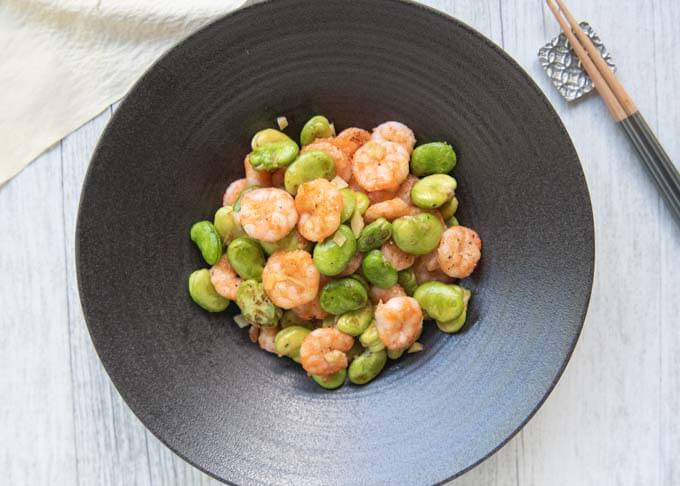
Yumiko![]()
Watch How To Make It
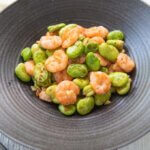
Broad Bean and Prawn Stir Fry is a very easy side dish with pretty colours. It is best served in spring when broad beans are in season. The combination of the fluffy texture of broad beans and plump prawns is superb.
Prep Time does not include the time to remove beans from pods and peel the soft skins. It took me about 15 minutes to remove beans from pods and peel the soft skins to get 120g/4.2oz of peeled broad beans.
Although the Ingredients list indicates the broad beans are already peeled, I included how to peel broad beans in the Instructions and the video.
Don't forget to see the section 'MEAL IDEAS' below the recipe card! It gives you a list of dishes that I have already posted and this recipe that can make up a complete meal. I hope it is of help to you.
- 120g/4.2oz broad beans (pods and soft skin removed, note 1)
- 120g/4.2o uncooked school prawns (peeled and deveined, note 2)
- 10g/0.4oz ginger diced into thin 5mm/3⁄16" square pieces
- 2 tbsp oil separated
- ¼ tsp salt
- 2 tbsp water
- 1 tbsp corn flour/cornstarch
- 1 tbsp cooking sake
- Salt and pepper
-
Break the tip of the pod and pull tough strings that run on both sides of the pod towards the other end of the pod. You may only get a string from one side (note 3).
-
Break open the pod from the side where the string came off, using the tip of your thumb. Then run your thumb through to open the pod.
-
Take all the beans out of the pods. The beans still have soft skins on.
-
Taking a bean at a time, break the end of the dented line (often the line is black) with your thumb and index finger, and peel it off along the line to break the outer pale green skin.
-
From the edge of the broken skin, peel the pale skin off.
-
Rinse the prawns and pat dry.
-
Heat 1 tablespoon of oil in a non-stick frying pan over medium heat.
-
Put broad beans into the pan and sauté for 1½ minutes. Add salt and water to the pan, and steam-sauté for 1 minute with a lid on (note 4).
-
Remove the lid and transfer the beans to a plate (note 5).
-
Wipe the frying pan while it has moisture on the bottom of the pan (note 6).
-
Dust the prawns with corn flour/cornstarch thoroughly.
-
Heat the remaining oil in the frying pan over medium low heat.
-
Put the prawns into the pan and sauté until the prawns change colour, turning over half-way (about 2 minutes in total).
-
Add ginger and the broad beans to the pan and mix.
-
Add cooking sake, a pinch of salt and pepper to the pan, and sauté for 15 seconds or so. Then remove the pan from the heat.
-
Divide between two serving bowls and serve immediately, or later at room temperature.
1. My broad beans weighed just over 500g/1.1lb. After removing the pods, they weighed about 200g/7.1oz. After removing the skin, they weighed 118g/4.2oz.
Instead of fresh broad beans, you can use frozen broad beans. After thawing the beans, break the soft skin, which is very easy to tear anywhere, and remove it. Check if they are already blanched or not because the method of cooking changes a bit as per note 4.
2. School prawns are the best for today's dish. The body length of my school prawns was about 7cm/2¾".
You can use large prawns if you can't find school prawns. You need to cut them into 3-4 pieces depending on the size of your prawns.
You can also use defrosted frozen prawns.
3. Once you remove the tough strings, it becomes easier to break open the pod along where the string was.
If the string breaks, you can push the tip of your thumb to force open the pod.
4. If you are using frozen broad beans that are already blanched, you don’t need to steam-sauté the beans. Quickly sauté them and transfer the beans to a plate.
5. There shouldn't be much water left in the pan. If there is some water in the pan, leave it on the stove to let it evaporate before transferring the beans to a plate.
6. Because the pan is still hot, it does not take long or the bottom of the pan to dry up, which makes it difficult to clean due to the starch from the beans. If this happens, add a small amount of water to wipe it.
7. Nutrition per serving.
serving: 151g calories: 247kcal fat: 15g (24%) saturated fat: 1.1g (6%) trans fat: 0g polyunsaturated fat: 2.6g monounsaturated fat: 10g cholesterol: 76mg (25%) sodium: 794mg (33%) carbohydrates: 16g (5%) dietary fibre: 4.6g (18%) sugar: 5.5g protein: 12.8g vitamin a: 0mcg (0%) calcium: 56mg (3%) iron: 1mg (2%) potassium: 303mg (9%)
Meal Ideas
A typical Japanese meal consists of a main dish, a couple of side dishes, a soup and rice. I try to come up with a combination of dishes with a variety of flavours, colours, textures and make-ahead dishes.
Since today’s dish uses a spring vegetable, I came up with a meal idea with dishes that use spring vegetables. The main dish uses a lot of cabbage, Side dish 2 contains asparagus, and the miso soup includes carrot and cabbage. Bamboo shoots in Takenoko Gohan is certainly a spring vegetable too.
- Main: Pork and Cabbage Omelette (Tonpeiyaki) – or a dish with a small amount of protein.
- Side dish 1: Broad Bean and Prawn Stir Fry – today’s recipe, you can make ahead.
- Side dish 2: Fried Vegetables in Broth (Vegetables Agebitashi) – or salad with spring vegetables.
- Soup: Cabbage and carrots miso soup from Miso Soup Ingredient Combinations .
- Rice: Rice with Bamboo Shoots (Takenoko Gohan) – or plain rice.
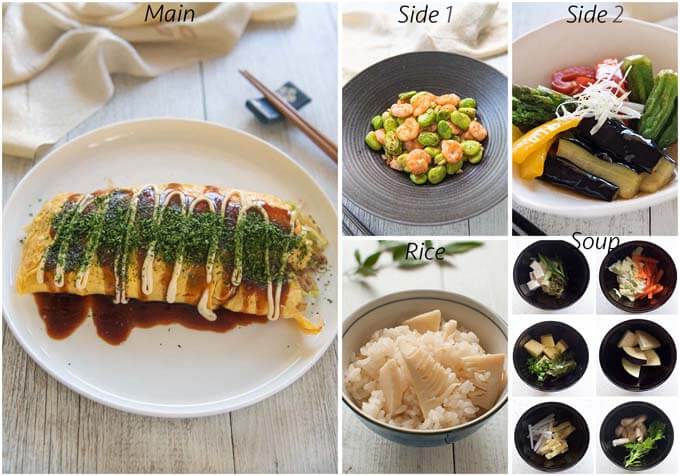
Leave a Reply